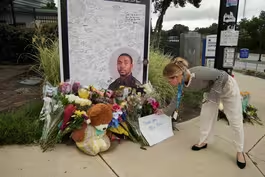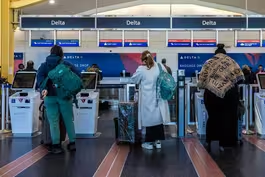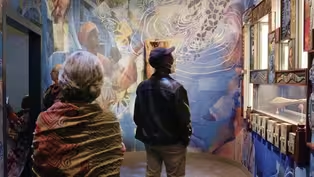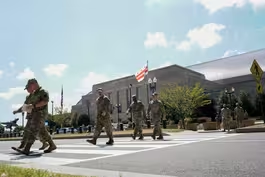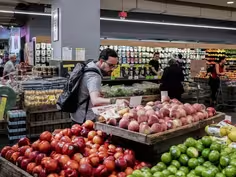
Sudan's famine worsens as civil war intensifies
Clip: 8/12/2025 | 5m 33sVideo has Closed Captions
Sudan's famine worsens as civil war intensifies: 'We have nothing to eat but animal feed'
Over the last two and a half years, a brutal civil war between the Sudan Armed Forces and paramilitary Rapid Support Forces has killed tens of thousands. Over 14 million Sudanese, more than a quarter of the population, have been displaced by the war. Stephanie Sy reports on the city of El Fasher in Darfur, which has faced famine for over a year. A warning, images in this story are disturbing.
Problems playing video? | Closed Captioning Feedback
Problems playing video? | Closed Captioning Feedback
Major corporate funding for the PBS News Hour is provided by BDO, BNSF, Consumer Cellular, American Cruise Lines, and Raymond James. Funding for the PBS NewsHour Weekend is provided by...

Sudan's famine worsens as civil war intensifies
Clip: 8/12/2025 | 5m 33sVideo has Closed Captions
Over the last two and a half years, a brutal civil war between the Sudan Armed Forces and paramilitary Rapid Support Forces has killed tens of thousands. Over 14 million Sudanese, more than a quarter of the population, have been displaced by the war. Stephanie Sy reports on the city of El Fasher in Darfur, which has faced famine for over a year. A warning, images in this story are disturbing.
Problems playing video? | Closed Captioning Feedback
How to Watch PBS News Hour
PBS News Hour is available to stream on pbs.org and the free PBS App, available on iPhone, Apple TV, Android TV, Android smartphones, Amazon Fire TV, Amazon Fire Tablet, Roku, Samsung Smart TV, and Vizio.
Providing Support for PBS.org
Learn Moreabout PBS online sponsorshipAMNA NAWAZ: This week, at least 40 people have been killed by Sudan's paramilitary Rapid Support Forces as fighting intensified in the Western Darfur region.
Over the last nearly 2.5 years, a brutal civil war between that paramilitary RSF and the Sudanese Armed Forces has killed tens of thousands of people and created the largest hunger and displacement crisis in the world.
Over 14 million people, more than a quarter of the population, have been displaced within and outside of Sudan, and the city El Fasher in Darfur faces famine and has for over a year.
Stephanie Sy brings us this update.
And a warning: Some of the images in this story may be disturbing.
STEPHANIE SY: This is the way to El Fasher in Darfur, Western Sudan, by donkey.
No aid enters here,a generation of its children facing starvation, eating animal feed to ease the gnawing hunger.
A famine was declared in the Zamzam camp in El Fasher more than a year ago.
FATMA YAQOUB, Displaced Mother (through translator): We are suffering so much from no food, no water.
We are hungry.
Our children are naked.
We have nothing to eat but animal feed.
There is no water.
We have nothing.
MOHAMMED ELDOUDA, Spokesperson, Zamzam Camp: The risk of using animal feed to eat is dangerous TO our health.
We are in acute starving and acute hunger.
STEPHANIE SY: Mohammed Eldouda works at Zamzam.
With hundreds of thousands living here, it's Sudan's largest internally displaced persons camp.
Eldouda filmed these videos.
For over a year, the camp and the city has been under a suffocating siege by the paramilitary Rapid Support Forces.
MOHAMMED ELDOUDA: Our civilians in El Fasher, from the morning, they are chasing, they are searching for the things to make or to prepare the meal or their food.
Because of the siege of El Fasher, nothing can enter, not the humanitarian aid, not goods.
STEPHANIE SY: What began as a power struggle between the Sudanese Armed Forces, or SAF, and the paramilitary Rapid Support Forces, the RSF, has escalated into a brutal civil war.
Sudanese cities are the battlegrounds.
And while Sudan's army is accused of war crimes, the paramilitary RSF is accused of genocide and ethnic cleansing.
In March, the Sudan army took back the capital city of Khartoum, which was captured and held by the RSF for nearly two years.
But, in April, the RSF declared a parallel government based in Darfur, a large region in Western Sudan of more than seven million people that has been the site of gross atrocities for two decades.
It is now largely controlled by the RSF, with the exception of the besieged El Fasher.
Another hot spot in the conflict, Kordofan, has become a strategic crossroads for both sides in the conflict.
The RSF killed dozens of people there in the last few weeks in one of the most deadly episodes of violence in this nearly-2.5-year conflict.
ADNAN HEZAM, International Committee of the Red Cross: International community, the world should be -- not ignore what is happening now in Sudan, because every day there is further escalation.
STEPHANIE SY: Adnan Hezam, the spokesperson for the International Committee of the Red Cross, spoke to the "News Hour" from Port Sudan.
ADNAN HEZAM: We are talking about 25 million people who need assistance in different aspects, food, shelter, water, medication, everything.
What we are witnessing, there is no respect for international humanitarian law.
So, the ICRC, since the eruption of this conflict, remind and urge all the parties involved in the conflict to respect the law, to spare the lives of civilians.
STEPHANIE SY: Their lives are precarious, caught in a cycle of famine and disease, a cholera outbreak, and on top of that, malaria.
The ICRC warns that Sudan's health infrastructure is at the brink of collapse, with 80 percent of facilities shut down.
Most people in conflict areas have no access to health care, and even those who do rely on these makeshift clinics.
In a village outside El Fasher, Huda Ali and her family escaped famine, but not the war.
She's pregnant and already the mother of four.
HUDA ALI, Displaced Mother (through translator): Until now, my husband the father of my children, has not come back to us from El Fasher.
I had fled with the children.
We have family members that are still missing.
STEPHANIE SY: And, everywhere, so much trauma.
Enaam Abdallah only 19, is haunted by what she's witnessed.
ENAAM ABDALLAH MOHAMMED, Displaced High School Student (through translator): They killed the people.
They killed people in front of us.
They took the girls in front of us and raped them.
STEPHANIE SY: Rape and starvation deployed as weapons of war in a part of the world that fears it's been forgotten.
For the "PBS News Hour," I'm Stephanie Sy.
CDC shooting highlights hostility against health workers
Video has Closed Captions
Clip: 8/12/2025 | 8m 2s | CDC shooting highlights increasing rhetoric and hostility against health professionals (8m 2s)
How to beat AI-driven custom pricing
Video has Closed Captions
Clip: 8/12/2025 | 4m 39s | How to beat AI-driven custom pricing (4m 39s)
Maine residency gives Black and Brown artists a platform
Video has Closed Captions
Clip: 8/12/2025 | 7m 52s | Maine arts residency gives Black and Brown artists a platform to develop their craft (7m 52s)
State Department drops criticism of Israel and El Salvador
Video has Closed Captions
Clip: 8/12/2025 | 6m 22s | State Department drops criticism of Israel and El Salvador in human rights report (6m 22s)
Tariff-driven inflation accelerating, AEI's Strain says
Video has Closed Captions
Clip: 8/12/2025 | 6m 7s | Tariff-driven inflation accelerating with 'worst yet to come,' AEI's Michael Strain says (6m 7s)
Providing Support for PBS.org
Learn Moreabout PBS online sponsorshipSupport for PBS provided by:
Major corporate funding for the PBS News Hour is provided by BDO, BNSF, Consumer Cellular, American Cruise Lines, and Raymond James. Funding for the PBS NewsHour Weekend is provided by...
